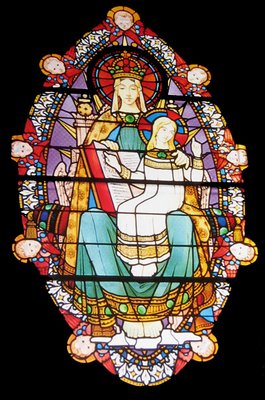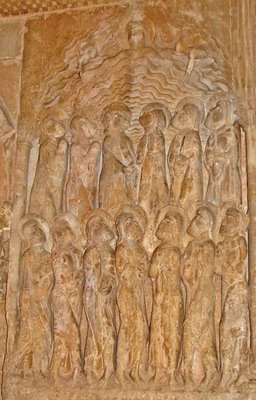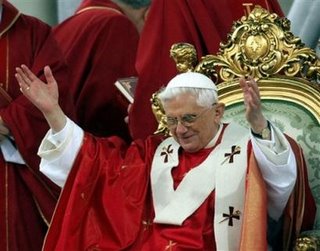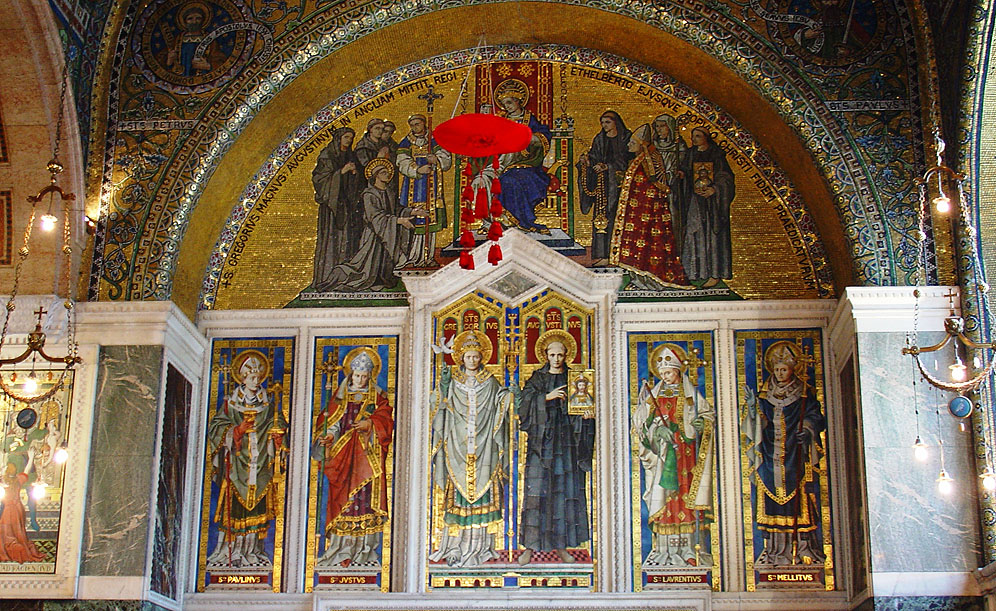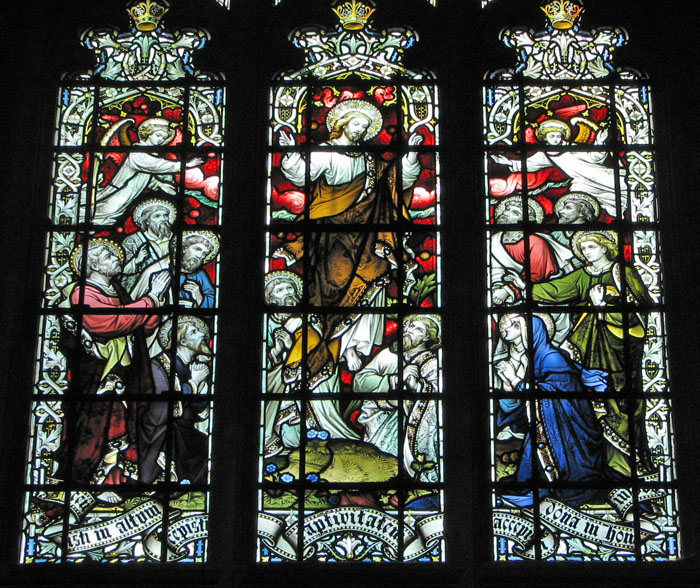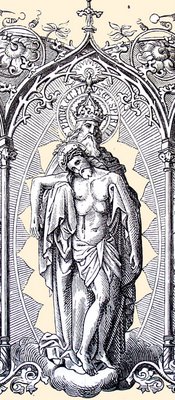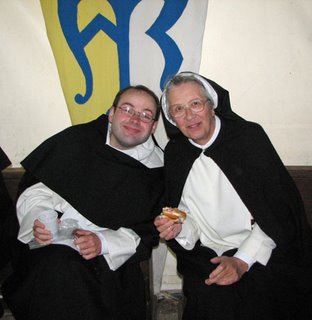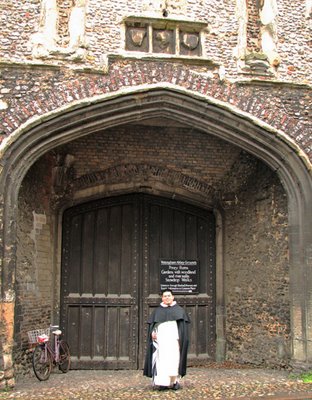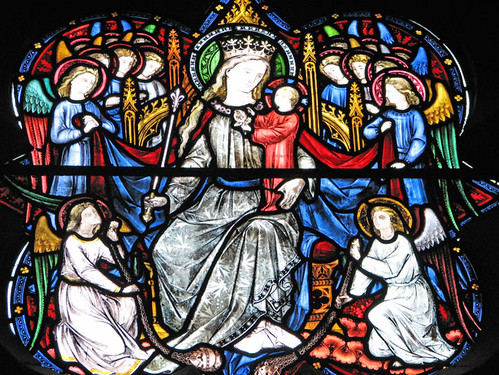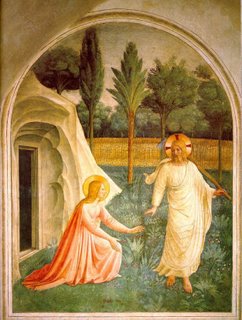Understanding the Visitation
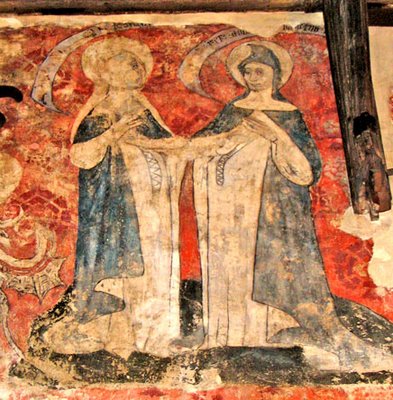 Today's joyous Feast of the Visitation culminates the month of Mary and also fittingly falls within the Novena before Pentecost, because the narrative in St Luke's Gospel of the encounter between Mary and Elizabeth and the fruit of their wombs, the Lord and His Herald, highlights the action of the Holy Spirit in human lives. John, while still in the womb leaps for joy upon hearing the voice of Our Lady and filled with the Holy Spirit, Elizabeth greets Mary with the words we still repeat in the 'Hail Mary'. This prompts the Blessed Virgin to sing her Canticle, those immortal words of the 'Magnificat' which have inspired generations of musicians and which Holy Mother Church lovingly chants every evening in her Divine Office.
Today's joyous Feast of the Visitation culminates the month of Mary and also fittingly falls within the Novena before Pentecost, because the narrative in St Luke's Gospel of the encounter between Mary and Elizabeth and the fruit of their wombs, the Lord and His Herald, highlights the action of the Holy Spirit in human lives. John, while still in the womb leaps for joy upon hearing the voice of Our Lady and filled with the Holy Spirit, Elizabeth greets Mary with the words we still repeat in the 'Hail Mary'. This prompts the Blessed Virgin to sing her Canticle, those immortal words of the 'Magnificat' which have inspired generations of musicians and which Holy Mother Church lovingly chants every evening in her Divine Office.The Holy Spirit had clearly given St Elizabeth some special knowledge and understanding because she did not yet know of Jesus' virginal conception in Mary's womb and yet she cried out with a divine insight: "Blessed are you among women and blessed if the fruit of your womb. And why has this happened to me, that the mother of my Lord comes to me?"(Lk 1:42-43).
Continuing our series on the Seven Gifts of the Holy Spirit, it seems to me apt to say that Elizabeth was given (among other Gifts), the Gift of Understanding (Intellectus). Writing about this Gift, fr Jordan Aumann OP explains:
"The gift of understanding is a supernatural habit, infused in the soul with sanctifying grace, by which the human intellect, under the illuminating action of the Holy Spirit, is made apt for a penetrating intuition of revealed truths... The essence of the gift of understanding is a penetrating intuition... simply speaking, this is a type of infused contemplation, a simple and profound intuition of truth... The gift of understanding produces admirable effects in the soul, and all of them perfect the virtue of faith. St Thomas Aquinas points out different ways in which the gift of understanding enables us to penetrate into the truths of faith.
It discloses the hidden meaning of the Sacred Scriptures... It reveals the mysterious significance of symbols and figures... It reveals spiritual realities under sensible appearences... It enables one to contemplate the effects that are contained in causes... It makes us see causes through their effects...
St Thomas stated: 'In this very life, when the eye of the spirit is purified by the gift of understanding, one can in a certain way see God.' These souls seem to be guided entirely by the divine instinct as to their manner of being, thinking, speaking or reacting to the events of their own lives or to the lives of others."
"Luke makes the content of Mary's Magnificat a reflective, prayerful meditation in which the basic structure of all authentic Christian prayer clearly comes to the fore... The Magnificat is first of all a grateful hymn of praise to the glory of God, i.e. praise of God purely and simply because he is what he is: a living God... This prayer comes from the depth of the psyche and the pneuma, that is, the praise arises from the innermost depths of the person praying: the one who prays is transformed completely and utterly into thanks and praise...
In the Magnificat which Luke attributes to Mary there are two reasons for this depth. God is addressed here as 'my Yeshua', my saviour. Mary praises God who has given her Yeshua, Jesus... Such a divine gift to a simple person, one of many, only increases the gratitude...
Prayer is praying in a tradition of prayer. The consequences of this tradition can also be seen in the Magnificat. Prayer is not just grateful praise of what God does for me; it is always also anamnesis, remembrance. The gracious act of God which people praise and for which they literally offer their congratulations is never in isolation. It must be seen in a wider context of never-ending gracious activity.
Therefore in the Magnificat there follows the great anamnesis of God: a proud remembrance of what God has done in the past... By means of this great remembrance, the believer who prays puts God's gracious act, of which the person who prays is itself the recipient, within the perspective of a more comprehensive saving event in which all others are involved. The prayer directs concern away from our own persons, and places everything within the wider context of a history which stands under God's promise: 'He protects Israel, his servant, remembering his mercy, the mercy promised to our fathers, to Abraham and his sons forever.'...
Prayer, however personal, however deeply it comes from a person's heart and spirit, is nevertheless only Christian prayer when this personal prayer is actively taken up into the perspective of the promise and saving history which are for all men and which transcend the purely personal dimension. This Christian characteristic removes all individualism from prayer and at the same time gives it a broader undercurrent: as it were the whole of history issues in Christian prayer...The Magnificat, a song of praise uttered to God by an expectant mother, is ultimately so completely taken up into a thanksgiving to God for the whole of the history of salvation that prayerful reflection on it arrives at the insight that this history is held in tension between a beginning and an end. In the Magnificat Mary is the eschatalogical, i.e. the final, personification of Israel, whereas Abraham, the 'father of all believers', is the protological, i.e. the first, personification of that same Israel. Between these two poles lies the whole of Israel's history, which has grown old in the longing for and expectation of the final coming of God's liberation... But now that God is at last definitively visiting his people in Jesus of Nazareth, these old men and women [Simeon, Hannah, Zechariah, Elizabeth] can sing their Nunc Dimittis: the new covenant has begun, permanently, and now at least everything can be different...
At all events, the saving action of God in history and reflection in prayer belong intrinsically together. Without recognition in prayer, our history can hardly be called salvation history, and without salvation history, prayer becomes purely a human projection without any foundation.
Therefore it is as though prayer is a harmonious accompaniment to God's own saving actions, the resonance of them in our spirits and in our hearts... Prayer is therefore 'pati divina', experiencing the divine, not in the (Neo-) Platonic sense, which is the context from which the word in fact comes, but in the Jewish-Christian sense: being open to the visitation, the coming of God into our history, letting the kingdom of God come."

Novena Prayer to the Holy Spirit
"O Loving Spirit, who alone can enlighten us, purify our minds of their dryness and darkness. Lover and Source of all right thinking, mercifully anoint us and inspire us with holy thoughts and desires. Purify our deepest intentions, that we may come to see the almighty Father, whom the pure of heart alone can see."









